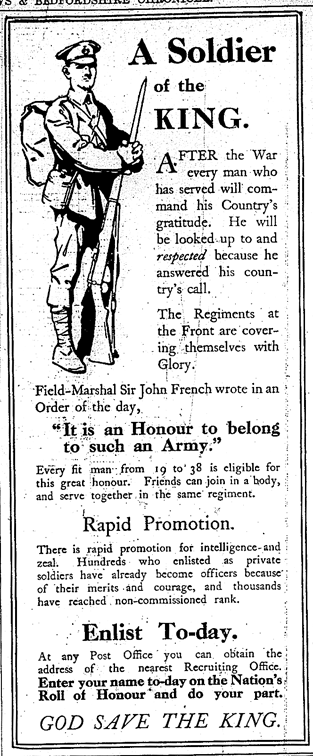"After the war every man who has served will command his country's gratitude. He will be looked up to and respected because he answered his country's call."
 These words were included in an advert placed in The Luton News on December 3rd, 1914. But even before that appeared the Beds National Health Insurance Committee was huffing and puffing over who should pick up the bill for benefits paid to and treatment for men wounded in action and invalided home.
These words were included in an advert placed in The Luton News on December 3rd, 1914. But even before that appeared the Beds National Health Insurance Committee was huffing and puffing over who should pick up the bill for benefits paid to and treatment for men wounded in action and invalided home.
For instance, should a soldier who was a member of an approved society before joining the forces receive benefits from that society rather than the Navy and Army Insurance Fund?
Dr J. W. Bone said it was of the greatest importance that there should be definite information as to what should be done in such cases. There were many cases where people had been embodied in the forces - either Regulars or Territorials - and invalided home. They generally went to the panel doctor and demanded medical treatment.
The medical men would like to know exactly how they stood in the matter. The men waited at their surgeries every night, and if the doctor refused treatment the men felt it was a hardship. He for one did not think such men were entitled to treatment. The medical men should be circularised when definite information had been obtained.
Mr G. W. Breath, a Divisional Inspector, said legislation stated that men who had been embodied were entitled only to maternity benefit and not to medical, sanitorium, sickness or disablement benefit until he secured his discharge.
Dr Bone said he could assure the committee that these men were obtaining medical benefit and were being prescribed for, and chemists were dispensing the precriptions. How did the chemists stand in the matter. Were they liable to be surcharged?
Dr Waugh said he did not think that medical men would refuse to attend to wounded men, or men who were ill. He would not refuse himself, but with the chemists the position was different.
So far as he was concerned he had 20 men to attend now, principally cases in temporary hospitals. He thought the feeling professionally was that, although these men could not be treated on the fund, the medical men should give their service free. The chemists were in a different position, they could not supply drugs free.
The whole question was referred to the Benefit Committee.
[The Luton News, November 19th, 1914]

